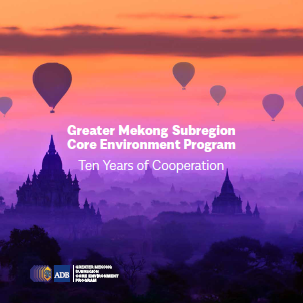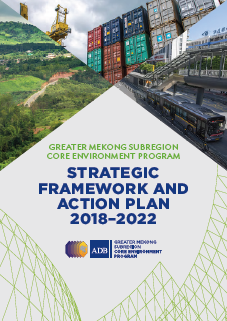Driving Toward Green Freight in the GMS
This introduces the green freight approach, which helps improve fuel efficiency and reduce carbon emissions of the transport sector.
In the Greater Mekong Subregion, 200 million people in rural areas depend on their surrounding environment for food, water, energy, and income. Forests, wetlands, mangroves, farmlands, and other ecosystems account for between 20% and 55% of the subregion's wealth.
The Working Group on Environment (WGE) provides overall leadership and direction for the subregion's Core Environment Program.
Natural ecosystems – and the food, water, energy, and other vital elements they provide – lie at the heart of the development of the Greater Mekong Subregion. How these natural resources are protected, managed, and enhanced will determine the long-term sustainability of its environment and economic development.
Overexploitation of natural resources, pollution, vulnerability to climate change, and ever-increasing natural disasters are threatening these ecosystems. In addition, environmental degradation is posing risks to sustained long-term growth, and could cost a whopping $55 billion in foregone services over the next 25 years if left unchecked.
Unless there is better planning and management, the subregion’s resource-intensive development approach could lead to food shortages, price shocks, health hazards, and environmental damage that impact thousands of families and put businesses at risk.
The GMS Economic Cooperation Program Strategic Framework 2030 (GMS-2030) will focus on improving environmental sustainability and climate change resilience in the subregion. Environment and climate change challenges will be addressed through green technologies; protection of ecosystems and key ecological processes; climate resilience policies; and disaster-risk management, all of which will recognize the essential role that communities play as stewards of natural resources. A systematic effort will be made to mainstream climate change considerations into all GMS interventions, with a focus on energy efficiency, renewable energy, climate-smart landscapes, and sustainable waste management, particularly in terms of healthy ocean and river systems, and the tackling of plastic pollution. GMS-2030 was endorsed and adopted at the 7th GMS Summit of Leaders in September 2021. It aims to provide a new setting for the development of this subregion for the next decade.
The Core Environment Program Strategic Framework and Action Plan 2018-2022 was endorsed by GMS ministers at the 5th GMS Environment Ministers' Meeting in Chiang Mai, Thailand, held on 30 January – 1 February 2018. The 5-year environment strategy focuses on green technologies and sustainable infrastructure, natural resources and ecosystem services, and climate resilience and disaster risk management.
The GMS Climate Change and Environmental Sustainability Program (GMS CCESP), the third and current phase of the GMS Core Environment Program, supports environmental cooperation and green investments in the GMS. It covers six priority themes that were identified during the 24th Annual Meeting of the GMS WGE in 2019: (a) building climate and disaster resilience; (b) facilitating low carbon transitions; (c) promoting climate-smart landscapes; (d) enhancing environmental quality through pollution control and sustainable waste management; (e) deploying digital technologies for climate actions and environmental sustainability; and (f) financing low-carbon and climate-resilient infrastructure and technologies, including demonstrating climate and disaster risk financing instruments. The GMS CCESP builds on the achievements and lessons from the first two phases of the GMS Core Environment Program, and runs until 2025.
The GMS Core Environment Program was designed to help countries in the GMS meet the increasing demand for food, energy, water, and other natural resources, while at the same time ensuring that resources are available for future generations. This included balancing rapid growth with sustainable practices, and protecting vital water resources, controlling floods, preserving biodiversity and critical ecosystems, and mitigating the impacts of urban expansion.
Related
• GMS Core Environment Program website
• Greater Mekong Subregion Climate Change and Environmental Sustainability Program (Brochure)
Contact Persons
Focal Persons at the Asian Development Bank
Srinivasan Ancha
Climate Change, Resilience, and Environment Cluster
Climate Change and Sustainable Development Department
Mark Bezuijen
Agriculture, Food, Nature, and Rural Development Sector Office
Sectors Group
Other Concerned Staff & Consultants
Alvin Lopez
Agriculture, Food, Nature, and Rural Development Sector Office
Sectors Group
Criselda Rufino
Agriculture, Food, Nature, and Rural Development Sector Office
Sectors Group
Asadullah Sumbal
Regional Cooperation and Integration Unit
Southeast Asia Department
Rafaelita Jamon
Regional Cooperation and Integration Unit
Southeast Asia Department/GMS Secretariat
Send inquiries to GMS SAFSP Secretariat and GMS Secretariat.
This introduces the green freight approach, which helps improve fuel efficiency and reduce carbon emissions of the transport sector.

Launched in 2006, the Core Environment Program supports environmental cooperation efforts to contribute to a vision of an ecologically rich subregion free of poverty.

The new 5-year strategy will focus on three priority thematic areas: green technologies and sustainable infrastructure, natural resources and ecosystem services, and climate resilience and disaster risk management.
Cambodia and Thailand have agreed to work together to protect wildlife and ecosystems in transboundary forest areas.
The German government is supporting two projects between Cambodia and the Lao People’s Democratic Republic (Lao PDR), and between Cambodia and Thailand to better manage resources in the Mekong River basin and address flood and drought issues.
A $10 million climate insurance program targets women farmers in Africa and Asia, including Cambodia and Myanmar.
HONG KONG, CHINA (2 February 2018) — The Asian Development Bank today signed a $100 million loan facility agreement with China Everbright International Limited to help a series of municipal waste-to-energy plants in primary and secondary cities in the Mekong Delta.
CHIANG MAI, THAILAND (1 February 2018) — Environment ministers from the six countries of the Greater Mekong Subregion endorsed a 5-year environment agenda that includes more than $540 million worth of priority projects to spur green investments and increase environmental cooperation to help the subregion achieve sustainable growth.
Biodiversity corridors have been introduced in threatened tropical areas of Yunnan province, People's Republic of China, with ADB support. The program is ensuring the survival of rare plant and animal species, while eco-farming practices provide local communities with sustainable livelihoods.
An additional $2 million grant funding from the Climate Investment Fund–Technical Assistance Facility (CIF–TAF) was approved on 17 October 2021 by ADB. This grant will support green and resilient COVID-19 recovery in the GMS, covering Cambodia, Lao PDR, Thailand, and Viet Nam, through the CCESP TA. With this funding, the Climate Change and Environmental Sustainability Program (CCESP) will provide policy support, build institutional and technical capacities, and demonstrate innovative options to build back cleaner, greener, and more climate-resilient economies.